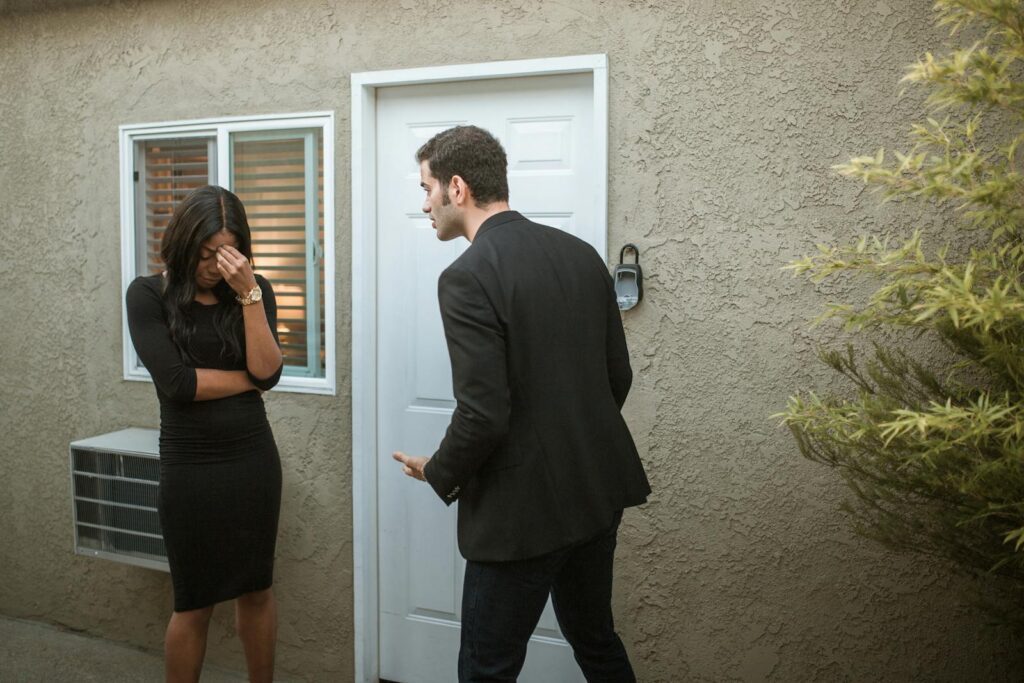
Not everyone who smiles at you has your best interest at heart. Some people hide their motives behind polite words or friendly talk, but you can catch the hints if you pay close attention. All these phrases sound harmless on the outside, but they reveal selfishness or envy underneath. Here are 15 things people with bad intentions casually say and what they really mean.
They Say, “I’m Just Joking”

When someone constantly insults you or points out your flaws and then laughs it off with “I’m just joking,” it is rarely harmless humor. This phrase is a way to mask cruelty and shift blame onto you for being “too sensitive.” What sounds like playfulness often exposes hidden resentment or jealousy. Real friends do not disguise their negativity as jokes. They lift you up instead of tearing you down.
They Say, “You’re Overthinking It”

This phrase is used to dismiss your instincts or make you doubt yourself. Instead of answering your concern, the person tries to silence it. While it sounds like reassurance, it is really a way of brushing off your valid feelings. People with bad intentions do not want you to trust your own judgment, because if you did, you would see through their behavior.
They Say, “Everyone Else Thinks So Too”

By pulling imaginary crowds into the conversation, they make their opinion seem more valid. This statement pressures you into agreement, as if disagreeing would make you the odd one out. In reality, it is usually an exaggeration or a lie. People who truly care for you will not need a fake “majority” to back up their words. They will be honest on their own.
They Say, “I Don’t Mean to Be Rude, But…”

Almost every time this phrase shows up, rudeness follows right behind it. It is a warning that criticism is about to come, and the speaker wants to excuse their lack of kindness in advance. Instead of offering helpful feedback, they usually reveal jealousy or bitterness. Genuine advice does not need a disclaimer. It is given with care, not hidden behind false politeness.
They Say, “You’re Lucky to Have Me”

On the surface, it may sound playful, but it is actually a tool for control. By reminding you of your “luck,” they try to make themselves seem more valuable than they really are. Instead of gratitude, it is rooted in arrogance. People with sincere intentions never force you to feel indebted to them. They let their actions naturally show their worth.
They Say, “No Offense, But…”

This is another phrase that almost guarantees offense is coming. It is a way of pretending to soften the blow while still delivering a harsh or unnecessary comment. The truth is, if they really cared, they would find a kinder way to speak. People with bad intentions use this to get away with being disrespectful while acting as if they have done nothing wrong.
They Say, “I Was Only Trying to Help”

When someone constantly interferes or crosses boundaries, they may excuse it with this phrase. It sounds selfless, but more often it is a way to hide meddling or manipulation. Real help respects your choices and empowers you, not controls you. People with bad intentions like to present themselves as the “helper,” but their actions usually serve their own interests first.
They Say, “You’re Too Sensitive”

This phrase is used to twist the problem back onto you. Instead of acknowledging hurtful words or actions, the person tries to make you feel very weak or unreasonable. Over time, it can chip away at your confidence. While it sounds like they are pointing out your flaw, it is actually a tactic to avoid accountability. Honest people listen and adjust. Manipulators dismiss.
They Say, “I’d Never Do That to You”

On the surface, this sounds reassuring, but sometimes it is the opposite. People with bad intentions use it to paint themselves as trustworthy while hiding their true behavior. The louder they claim their loyalty, the more suspicious it often becomes. Real trust does not need constant promises. It is shown quietly through consistent actions, not dramatic declarations.
They Say, “I Thought You Could Handle It”

When someone hurts you or crosses a line, they may defend themselves with this phrase. It puts the blame on you for not meeting their expectations instead of owning their mistake. This way, they avoid guilt while still justifying their behavior. People with bad intentions do not respect limits. They test them, then claim you are at fault for reacting.
They Say, “You Owe Me”

This phrase may sound half-serious, but it is usually a sign of manipulation. Instead of helping you freely, they keep score and expect repayment for every favor. What seems like friendship is actually a transaction in disguise. People with bad intentions do not give without expecting something in return. They tie strings to every act of kindness, waiting to pull them later.
They Say, “You’ll Never Find Better”

This statement is meant to trap you by lowering your confidence. It may be in a relationship, friendship, or even work setting. By convincing you that they are your best option, they make you less likely to leave. People with pure motives encourage you to see your value, not limit it. Anyone who says this is more interested in control than care.
They Say, “I’m Only Being Honest”

While honesty is important, this phrase is often used as an excuse for being cruel. Instead of speaking truth with kindness, they use “honesty” as a cover for insults or negativity. Real honesty builds trust and growth, while fake honesty tears you down. People with bad intentions love to disguise their harshness as virtue, but the damage it causes reveals the truth.
They Say, “Everyone Makes Mistakes”

At first, it sounds humble, but often this phrase is used to downplay serious wrongdoing. Instead of taking responsibility, they try to make their actions seem smaller than they are. While mistakes are human, excuses show a lack of genuine remorse. People with good intentions admit fault and make it right. Those with bad intentions want you to overlook their behavior.
They Say, “Trust Me”

It sounds simple, but when said too often, it raises red flags. People with bad intentions ask for trust with their words because their actions do not earn it. They lean on charm instead of character, and push you to believe them without proof. True trust is earned over time through consistency. If someone has to keep saying “trust me,” chances are you should not.

